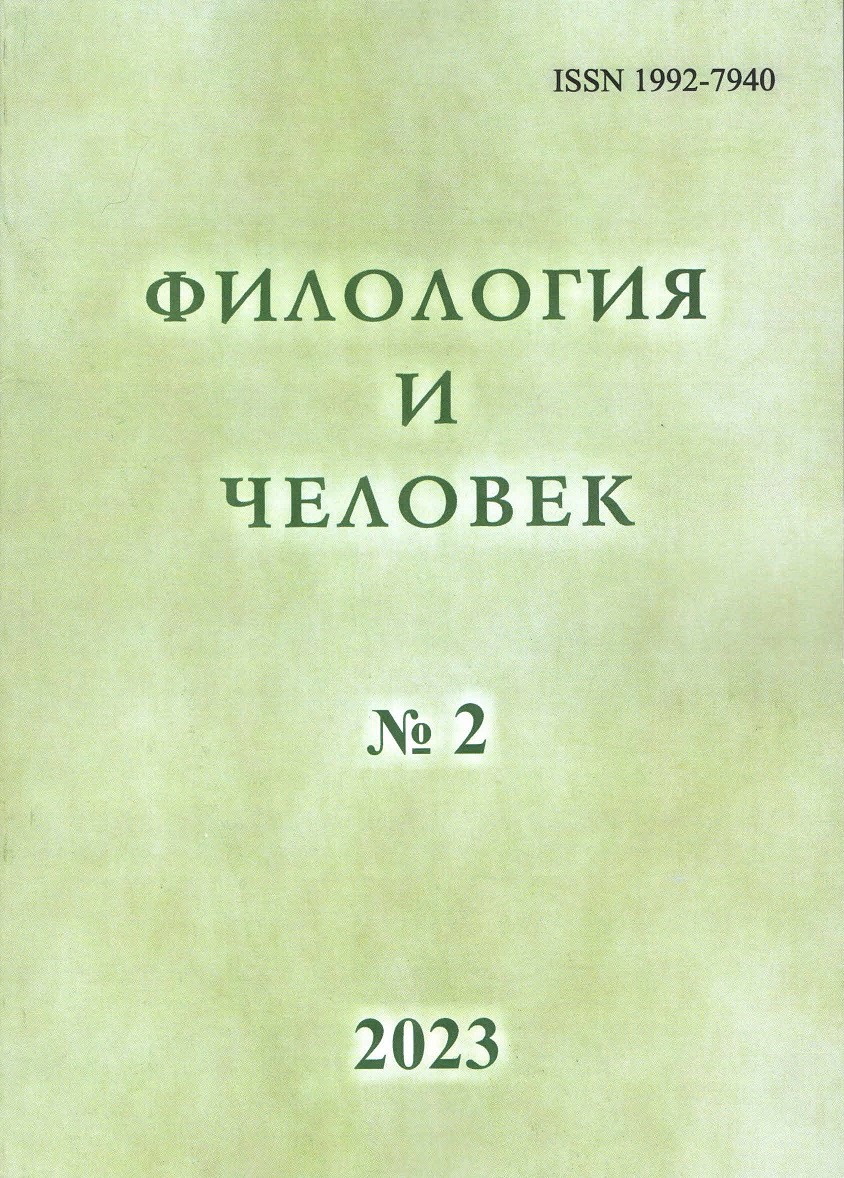Emotional Constituent of Rhetorical Questions (Based on the Lyrics of English Songs)
Abstract
The article deals with rhetorical questions whose importance is evaluated, while interpreting the speaker’s psychological and emotional state. The author of the article offers theories about this grammatical unit, provided by foreign linguists. The theoretical aspects are supported with the examples from English songs of two long-plays A Brief Inquiry Into Online Relationships (2018) and Notes On A Conditional Form (2020), performed by the band The 1975. While writing lyrics, the author of the songs uses this or that type of rhetorical questions: the ones connected to the communicative function of preference (preference structure) or to the one of favour; either positive or negative rhetorical questions; or the questions starting with why question-word (wh-question). It is the diversity of emotions he wants to present to the audience that determines the author’s choice. Rhetorical questions help to realize the correlation of the author’s choice of a definite rhetorical question to the emotions of this very author.
Downloads
Metrics
References
Библиографический список
Кочкинекова А.В. Проявление фасадности в англоязычной культуре // Филология и человек, 2017. № 1.
Широких И.А. Эмоциональная составляющая категории времени и категории вида (на материале текстов англоязычных песен) // Филология и человек, 2022. № 1.
Bardenstein R. Constructionalized Rhetorical Questions // R. Bardenstein // Tel Aviv University, 2015.
Blakemore C. et al. Narrating psychological distress: Associations between cross-clausal integration and mental health difficulties / C. Blakemore et al // Applied Psycholinguistics // Oxford University, 2011.
Breeze R. Balancing neutrality and partiality in arbitration: discursive tensions in separate opinions / R. Breeze // Text & Talk, 2016.
Harrison V. et al. Are you serious?: Rhetorical Questions and Sarcasm in Social Media Dialog / V. Harrison et al // Proceedings of the 18th Annual SIGdial Meeting on Discourse and Dialogue., 2017.
Hartshorne J. K. et al. Linking Meaning to Language: Verbs of Psychological State and the Linking Problem // J. K. Hartshorne et al // Massachusetts Institute of Technology. – 2010.
Heinemann T. ‘Will you or can’t you?’: Displaying entitlement in interrogative requests / T. Heinemann // Journal of Pragmatics, 2006.
Koshik I. Beyond Rhetorical Questions: Assertive questions in everyday interaction / I. Koshik. – Amsterdam / Philadelphia : John Benjamins Publishing Company, 2005.
Min H.-J., Park J. C. Analysis of Indirect Uses of Interrogative Sentences Carrying Anger // H.-J. Min, J.C. Park // KAIST, 2007.
Rexach J. G. Rhetorical Questions, Relevance and Scales / J. G. Rexach // Revista Alicantina de Estudios Ingleses, 2018.
Rohde H. Information Theoretic Approach to Rhetorical Questions // H. Rohde // University of California San Diego, 2018.
Список источников
[The Sound Lyrics // The 1975 // Genius / Genius Media Group Inc. URL: https://genius.com/The-1975-the-sound-lyrics].
References
Kochkinekova A.V. Proyavlenie fasadnosti v angloyazychnoj kul'ture // In: Filologiya i chelovek. [Philology & Human]. 2017. No. 1.
Shirokih I.A. Emocional'naya sostavlyayushchaya kategorii vremeni i kategorii vida (na materiale tekstov angloyazychnyh pesen) // In: Filologiya i chelovek. [Philology & Human]. 2022. No. 1.
Bardenstein R. Constructionalized Rhetorical Questions // R. Bardenstein // Tel Aviv University, 2015.
Blakemore C. et al. Narrating psychological distress: Associations between cross-clausal integration and mental health difficulties / C. Blakemore et al // Applied Psycholinguistics // Oxford University, 2011.
Breeze R. Balancing neutrality and partiality in arbitration: discursive tensions in separate opinions / R. Breeze // Text & Talk, 2016.
Harrison V. et al. Are you serious?: Rhetorical Questions and Sarcasm in Social Media Dialog / V. Harrison et al // Proceedings of the 18th Annual SIGdial Meeting on Discourse and Dialogue., 2017.
Hartshorne J. K. et al. Linking Meaning to Language: Verbs of Psychological State and the Linking Problem // J. K. Hartshorne et al // Massachusetts Institute of Technology. – 2010.
Heinemann T. ‘Will you or can’t you?’: Displaying entitlement in interrogative requests / T. Heinemann // Journal of Pragmatics, 2006.
Koshik I. Beyond Rhetorical Questions: Assertive questions in everyday interaction / I. Koshik. – Amsterdam / Philadelphia : John Benjamins Publishing Company, 2005.
Min H.-J., Park J. C. Analysis of Indirect Uses of Interrogative Sentences Carrying Anger // H.-J. Min, J.C. Park // KAIST, 2007.
Rexach J. G. Rhetorical Questions, Relevance and Scales / J. G. Rexach // Revista Alicantina de Estudios Ingleses, 2018.
Rohde H. Information Theoretic Approach to Rhetorical Questions // H. Rohde // University of California San Diego, 2018.
List of sources
[The Sound Lyrics // The 1975 // Genius / Genius Media Group Inc. URL: https://genius.com/The-1975-the-sound-lyrics].
Редакционная коллегия научного журнала «Филология и человек» придерживается принятых международным сообществом принципов публикационной этики, отраженных, в частности, в рекомендациях Комитета по этике научных публикаций (Committee on Publication Ethics (COPE), Кодекс этики научных публикаций), а также учитываeт ценный опыт авторитетных международных журналов и издательств.
Во избежание недобросовестной практики в публикационной деятельности (плагиат, изложение недостоверных сведений и др.), в целях обеспечения высокого качества научных публикаций, признания общественностью полученных автором научных результатов каждый член редакционной коллегии, автор, рецензент, издатель, а также учреждения, участвующие в издательском процессе, обязаны соблюдать этические стандарты, нормы и правила и принимать все разумные меры для предотвращения их нарушений. Соблюдение правил этики научных публикаций всеми участниками этого процесса способствует обеспечению прав авторов на интеллектуальную собственность, повышению качества издания и исключению возможности неправомерного использования авторских материалов в интересах отдельных лиц.





